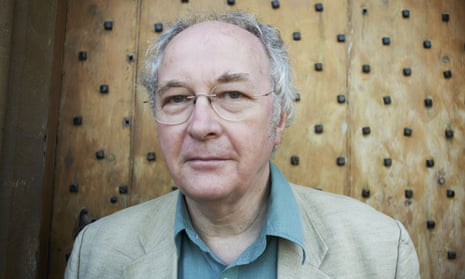Oxford literary festival has announced that it will in future pay all authors who appear there. The news follows an 11-month standoff prompted by Philip Pullman’s resignation as patron on the basis that it was no longer acceptable to expect writers to “work for nothing”.
Pullman’s resignation followed a wave of anger from leading authors, 30 of whom went on to sign a letter calling for a boycott of the event, which will celebrate its 21st year in April.
A statement posted on the festival website on Tuesday announced that after conferring with interested parties, it had “rebalanced our budgets” in order to pay “£150 to all authors speaking at the 2017 festival and thereafter”.
Joanne Harris, festival patron and a member of the Society of Authors’ management committee, called it “super good news”. “It was a very tricky situation last year when Philip pulled out because I thought ‘Really, I should do the same’,” Harris told the Guardian. “But I also wanted to fix things from within and add my voice to those of the Society of Authors, who were telling [OLF] to rethink their model. I am so pleased they have, so I can keep supporting them and do so without feeling I am being torn between two things I believe in.”
Author fees vary widely between the UK’s 350 literary festivals; the Edinburgh international book festival pays £200 per author per event, while the Cambridge literary festival offers authors £100, plus accommodation, where requested. Authors at Hay festival are paid varying amounts, in either cash or wine. There is currently an informal agreement amongst Scottish festivals to pay a standard rate of £150 or more per author per event, though the Scottish Book Trust, which funds many festivals north of the border, has announced that its rates are increasing to £170 plus expenses in 2017.
The average earnings for a professional full-time author in the UK is just £12,500, according to a recent European commission report, well below the minimum wage for a full-time job (£18,000).
Harris, who has only attended festivals that pay in 2016, said she was not consulted on the plans but that she had “certainly made my opinion known – and I was not the only one who had severe misgivings”.
“These festivals work terribly hard to do something we all believe in. But why would everything else be paid for and not the guests? It is not about me wanting £150, it is about the principle – and about the authors who are genuinely strapped for cash. Authors look at festivals and think ‘Can I afford to go?’ That is bad for festivals and the public.”
The Society of Authors praised the decision as setting a precedent for other book festivals. “We believe Oxford literary festival’s decision to join others that already offer payment to authors sets an excellent example to those that don’t. Like Oxford, any festival can review its finances to see who it is paying and who is being left out of pocket, and question whether that balance should be better,” the statement read.
But Nicola Solomon, Society of Authors chief executive, told the Guardian that Oxford had been asked for an assurance that it would pay VAT and expenses on top of the fee. And even so, she said, “My feeling that £150 plus VAT and expenses is a little on the low side for a major festival. Although an event may only be an hour, an author seldom loses less than a day when you take into account preparation and travel. We recommend Andrew Bibby’s reckoner, which shows daily rates to equate with different salaries. Using that reckoner a fee of £150 equates to an annual salary of £13,500.”
Pullman said: “Authors have had to cope with declining incomes for 20 years or so now — not because people weren’t buying our books, but because they weren’t being sold at a fair price. The recognition that the people who bring in the audiences are actually entitled to a cut of the profits is something I’m very glad to welcome, and I hope the principle of fairness will spread throughout the entire literary and musical and artistic economy.”
While OLF’s commitment falls short of the £200-£300 that Solomon told the Guardian podcast she felt authors should be paid earlier this year, Harris said the announced fee was not unusual for a festival. “If this goes ahead and works, they may be able to pay more in future,” she said. “What they will lose from one part of the budget, they may well gain back from the extra support they’ll get for being perceived as being supportive of authors.”
However, the precedent is already worrying other festival organisers. Cathy Moore, director of Cambridge festival, which has just hosted 35 events over a weekend, said they had various policies on author pay, such as not paying local writers but offering them complementary tickets to other events, but paying debut authors “because I think they need it.” Of the 28 authors eligible for payment over the weekend, 16 had requested it.
“But it’s very difficult and complex,” she said, “and my fear is that if we were to pay everyone a set rate, agreed with the Society of Authors, we’d end up with dumbed down generic festivals because, in order to survive financially, we’d have to programme according to commercial rather than strategic or artistic criteria”.

Comments (…)
Sign in or create your Guardian account to join the discussion